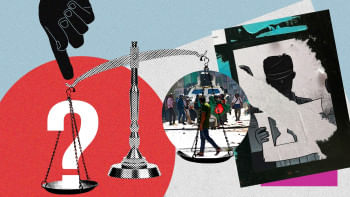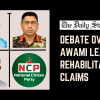Stop legal harassment through dubious cases

We are concerned about the trend of filing dubious cases against individuals with alleged ties to Awami League, which persists even nearly nine months after the August 5 political changeover. Journalists have been frequent targets of this legal assault. According to a report, at least 137 journalists have been implicated in 32 criminal cases filed in Dhaka, Chattogram, Bogura, and Rajshahi over the July-August events—the latest of them registered at the Mirpur police station on April 20, accusing Sheikh Hasina and 407 others, including 24 journalists, of involvement in the killing of BNP activist Mahfuz Alam Shraban. In addition to murder and attempted murder, journalists have also been charged with unlawful assembly, rioting, abduction, vandalism, extortion, assault, and even genocide and crimes against humanity.
As a Supreme Court lawyer has noted, even in places where no student movement took place or no one died, journalists have been falsely implicated. Referring to the case of a journalist couple who were sued for murder, he noted that while journalists may have committed other offences for which they could be booked, a murder charge "sounds vague." The argument that those who aided, committed or enabled July atrocities and those who extended moral support to the regime—through talk shows or speeches, for example—belong in the same bracket is not only legally tenuous; it also opens the door to abuse, complicates and likely lengthens the trial process, and invites question marks over the outcome of ongoing trials. The implication of actor Iresh Zaker in the Shraban murder case, alongside journalists, doctors, businesspeople, and lawyers, further illustrates that anyone is fair game in such a climate.
The Shraban case exemplifies how the right to file cases is being abused. Three individuals named as witnesses in the case have said they were unaware of being listed. The case statement lists eight in total, including the plaintiff, and provides the phone numbers of four. This newspaper spoke to all four; three of them denied any prior knowledge of their inclusion. The manner in which the whole case came into being—about nine months after the uprising, at the behest of "an administrative office in Paltan," using false witnesses, and implicating hundreds merely for their "support" of Hasina—reeks of both personal/political vendetta and a broader campaign against those even loosely associated with the previous regime. Unfortunately, the current process for filing cases does not require police officers to verify claims at the outset, allowing anyone to lodge complaints. This is why the government's instruction to police not to harass or arrest anyone wrongly implicated offers little hope or protection in practice.
For journalists, this trend marks a new chapter in a country where they already routinely face threats, harassment, and intimidation. But it must be countered for the sake of everyone given how widespread it has been. It is crucial to address the underlying loopholes in the case-filing process—by strengthening initial verification mechanisms and disallowing mass, exploitative accusations—and to ensure accountability for any misuse of legal provisions. The government alone cannot address this problem. Political parties, too, must come forward to stop this alarming trend.


 For all latest news, follow The Daily Star's Google News channel.
For all latest news, follow The Daily Star's Google News channel. 









Comments